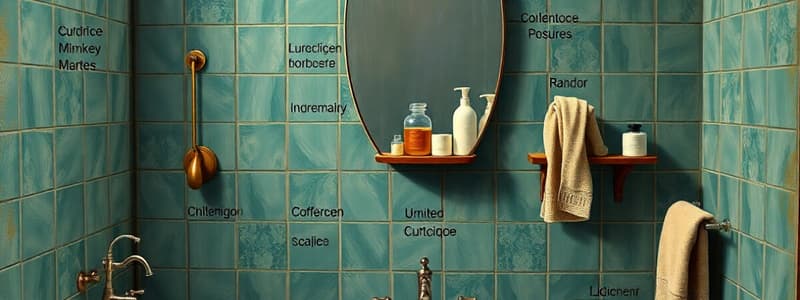Podcast
Questions and Answers
What is the correct English translation of 'el inodoro'?
What is the correct English translation of 'el inodoro'?
- toilet (correct)
- soap
- bathroom
- alarm clock
Which of the following translates to 'to wash one's face' in Spanish?
Which of the following translates to 'to wash one's face' in Spanish?
- cepillarse el pelo
- afirmarse
- maquillarse
- lavarse la cara (correct)
What does 'por la tarde' translate to in English?
What does 'por la tarde' translate to in English?
- at night
- finally
- in the afternoon; in the evening (correct)
- in the morning
Which term means 'to go to sleep' in Spanish?
Which term means 'to go to sleep' in Spanish?
What is the equivalent English term for 'la rutina diaria'?
What is the equivalent English term for 'la rutina diaria'?
What is the English translation of the Spanish verb 'acostarse'?
What is the English translation of the Spanish verb 'acostarse'?
Which reflexive verb means 'to remember' in English?
Which reflexive verb means 'to remember' in English?
What does the verb 'enojarse' translate to?
What does the verb 'enojarse' translate to?
Which of the following verbs means 'to try on' in English?
Which of the following verbs means 'to try on' in English?
What does the verb 'quitarse' mean?
What does the verb 'quitarse' mean?
Flashcards
Bathroom Objects
Bathroom Objects
Items found in a bathroom, like el baño (bathroom), el inodoro (toilet), and el jabón (soap).
Daily Routine Activities
Daily Routine Activities
Activities typically performed each day, including bañarse (to bathe), cepillarse el pelo (to brush one's hair), and dormirse (to go to sleep).
Temporal Expressions
Temporal Expressions
Words used to express time of day and sequence, such as antes de (before), después (afterwards), and por la mañana (in the morning).
Regional Variations
Regional Variations
Signup and view all the flashcards
Footwear Variations
Footwear Variations
Signup and view all the flashcards
Reflexive Verbs
Reflexive Verbs
Signup and view all the flashcards
Common Reflexive Verbs
Common Reflexive Verbs
Signup and view all the flashcards
Pronunciation Guide
Pronunciation Guide
Signup and view all the flashcards
Afeitarse vs. Rasurarse
Afeitarse vs. Rasurarse
Signup and view all the flashcards
Ducha vs. Regadera
Ducha vs. Regadera
Signup and view all the flashcards
Study Notes
Spanish Vocabulary for Daily Routines
- Bathroom objects: Bathroom related items include el baño (bathroom), el inodoro (toilet), and el jabón (soap).
- Daily Routine Activities: The Spanish words la rutina diaria (daily routine) encompasses activities like bañarse (to bathe), cepillarse el pelo (to brush one's hair), dormirse (to go to sleep), and lavarse la cara (to wash one's face).
- Temporal Expressions: Spanish words for time of day and sequence include antes de (before), después (afterwards), durante (during), entonces (then), luego (then), más tarde (later on), por la mañana (in the morning), por la noche (at night), por la tarde (in the afternoon), and por último (finally).
Regional Variations in Spanish
- Vocabulary variations occur in different Spanish-speaking regions. For example, afeitarse (to shave) has variations like rasurarse (Mexico, Central America), ducha (shower) can be regadera (Colombia, Mexico, Venezuela), and ducharse (to shower) can be bañarse (Latin America).
- Footwear terms: pantuflas (slippers) can also vary depending on the region, like chancletas (Mexico, Colombia), and zapatillas (Spain).
Common Reflexive Verbs in Spanish
- Reflexive verbs are verbs where the subject performs the action on themselves.
- Examples of common reflexive verbs: acordarse (to remember), acostarse (to go to bed), afeitarse (to shave), bañarse (to bathe), cepillarse (to brush), despertarse (to wake up), dormirse (to go to sleep), ducharse (to shower), enojarse (to get angry), irse (to go away), lavarse (to wash oneself), levantarse (to get up), llamarse (to be called), maquillarse (to put on makeup), peinarse (to comb one's hair), ponerse (to put on), preocuparse (to worry), probarse (to try on), quedarse (to stay), quitarse (to take off), secarse (to dry oneself), sentarse (to sit down), sentirse (to feel), vestirse (to get dressed).
- Pronunciation Guides: The table includes pronunciation guides for verbs like acordarse (o:ue) and despertarse (e:ie) which are relevant for Spanish students.
Studying That Suits You
Use AI to generate personalized quizzes and flashcards to suit your learning preferences.




